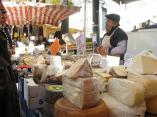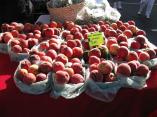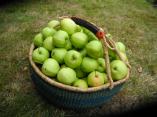There’s an amazing exhibition of wartime posters about food and agriculture which you can enjoy virtually, if you are unable to visit the National Library of Agriculture in Beltsville, Maryland.
Back here in nambypambyland, you’d think you were in some kind of wartime, and maybe you are. Just across the Salish Sea, farmers and food producers are revolted by the behaviour of the Canadian Food Inspection Agency which has come down on a local food store in Vancouver, The Home Grow-In Grocer (which was celebrating its first birthday on my last trip to the big city) for stocking local products which (gasp) don’t have bilingual (French) labelling. And various other labelling infractions, rendering many foods officially unsaleable.
Seizing perfectly good stock on such lame grounds would be bad enough, but the repercussions for the food producers are in some cases crippling, as it makes their products unsaleable until they are able to find the time and money to invest in conforming to standards which are (here we go again) in place mostly because we can’t trust multinationals to tell the truth about our food supply.
And why is the CFIA picking on a neighbourhood grocery anyway, when Vancouver boasts a world of non-compliant ethnic groceries, and one of the biggest selection of Chinese and other Asian foods in the continent – many of those items not even labelled in English? I bought a jar of jam in Quebec last month that had no English on it at all; since I was in a French-speaking part of Canada I was neither surprised nor moved to call the inspection agency over it.
This is not, it seems to me, an issue of food safety: rendering a product label into French in an English-speaking part of the country is not going to make a food any safer for anyone. So why are the inspectors wasting time and money on all this? When you look at their list of recalls, you wonder how they have time to do anything but keep up with the industrial scale producers that cause most of the trouble.
Certainly I think it’s important to include ingredient labelling on a product: I wouldn’t normally buy anything that lacks such information, and I would agree producers should be required to produce such labels if they don’t have them. Nutrition labels… I don’t know; maybe. But for heaven’s sake: locally-produced food in a local shop doesn’t need to carry translated labels.
Canada is not the only one struggling with this misdirection of its food inspectors. The Americans do it as well. I’m sure Europe has a catalogue of incidents too, since its labelling regulations are as complex as its membership’s food traditions, in cultures where those traditional foods are fighting for survival against easier-to-regulate mass-produced industrial products. And where there is a long history of attempting to balance food safety against traditional methods of food preparation and preservation. Understandable in a region where food safety concerns like BSE have created catastrophic problems for consumers. But these illnesses are overwhelmingly the product of overproduction and profiteering, not artisanal production.
One happy note in the food world is the enlightened thinking of Canada’s Governor-General, who has seen fit to recognize food and drink for national honours. Sinclair and Frédérique Philip who founded Sooke Harbour House and nurtured a generation of excellent chefs, were among the recipients for the first Governor General’s Award in Celebration of the Nation’s Table this year. They have been tireless advocates for local and sustainable eating and have managed to deliver world-class dining in an unlikely location, a long drive from Victoria, which they’ve made a stunningly beautiful restaurant and b&b.;










0 Responses to War on local food